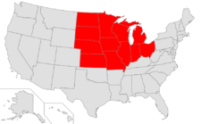 It used to be a relatively rare event when a bill remedying errors or omissions in public notice advertising was introduced. Or when legislation authorizing newspaper websites or e-editions to substitute for print was proposed. But those types of measures have proliferated in 2023, along with bills designed to fill jurisdictional holes in news deserts, which have been picking up steam for a few years now.
It used to be a relatively rare event when a bill remedying errors or omissions in public notice advertising was introduced. Or when legislation authorizing newspaper websites or e-editions to substitute for print was proposed. But those types of measures have proliferated in 2023, along with bills designed to fill jurisdictional holes in news deserts, which have been picking up steam for a few years now.
Newspapers battle in 2 states over right to publish notices
 Most states require newspapers to have paying subscribers to publish notices but at least a few grant that authority to free-distribution papers as well. Those requirements don’t change very often which is why it’s so unusual to have two states considering legislation this year that would allow free papers to publish notices.
Most states require newspapers to have paying subscribers to publish notices but at least a few grant that authority to free-distribution papers as well. Those requirements don’t change very often which is why it’s so unusual to have two states considering legislation this year that would allow free papers to publish notices.
The newspapers supporting the measures in both states were founded by entrepreneurs in communities where the paid-circulation newspapers have experienced multiple rounds of layoffs and cutbacks in recent years. Taking the other side of the debate are the states’ press associations, both of which oppose the bills.
Newspaper notice targeted in multiple states
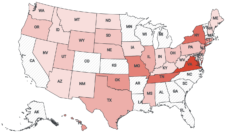 Bills have been introduced in at least 15 states allowing or requiring official notice to be published on various platforms other than local newspapers. That’s significantly more legislative activity focused on replacing newspaper notice than last year and approaches the level of the previous election off-year of 2021.
Bills have been introduced in at least 15 states allowing or requiring official notice to be published on various platforms other than local newspapers. That’s significantly more legislative activity focused on replacing newspaper notice than last year and approaches the level of the previous election off-year of 2021.
What happens after the bill passes?
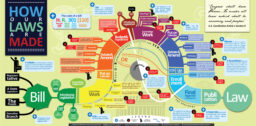 For over 20 years, newspapers and their state press associations turned back every bill that authorized government units to issue public notice via their own websites instead of local newspapers. That winning streak ended last year when the Florida legislature gave state agencies and local governments the option to post notices on county websites.
For over 20 years, newspapers and their state press associations turned back every bill that authorized government units to issue public notice via their own websites instead of local newspapers. That winning streak ended last year when the Florida legislature gave state agencies and local governments the option to post notices on county websites.
The new law, which took effect on Jan. 1, has one upside. It set in motion a vast experiment that will tell us what local governments do when given this choice. Five weeks into the new year an answer is beginning to emerge: It depends primarily on the motivations of local elected officials and the actions local newspapers take in response to the challenge.
Public Notice Year in Review
 When Gov. Ron DeSantis signed House Bill 7049 in May, Florida became the first state to enact a law allowing local governments to publish notices on their own websites rather than in newspapers.
When Gov. Ron DeSantis signed House Bill 7049 in May, Florida became the first state to enact a law allowing local governments to publish notices on their own websites rather than in newspapers.
But the big takeaway in Florida turns out to be that the passage of the bill was only the beginning of the story, not the end. Local governments in the Sunshine State don’t appear to be in a rush to abandon newspaper notice when HB-7049 takes effect on Jan. 1. In fact, the only county that has formally considered the issue decided to stick with newspapers. Public officials’ response to the new law is proving the enduring efficacy of providing official notice via local newspapers.
Expanding public notice eligibility requirements
 The newspaper industry that existed when public notice laws were originally enacted is a thing of the past. There are fewer newspapers and they have less circulation. The papers are physically smaller and sometimes they’re designed, edited and/or printed at great geographical distances from the local markets in which they circulate. They’re also published electronically with a reach and immediacy that were unprecedented in the pre-internet era.
The newspaper industry that existed when public notice laws were originally enacted is a thing of the past. There are fewer newspapers and they have less circulation. The papers are physically smaller and sometimes they’re designed, edited and/or printed at great geographical distances from the local markets in which they circulate. They’re also published electronically with a reach and immediacy that were unprecedented in the pre-internet era.
These changes have made it increasingly difficult for newspapers and government agencies to discharge their responsibilities under public notice laws enacted many decades ago. As a result, state press associations otherwise reluctant to meddle with public notice statutes now may find it necessary to advocate for changes to ensure the laws that determine which papers qualify to publish notices remain relevant.
Scope of Florida’s new public notice law questioned
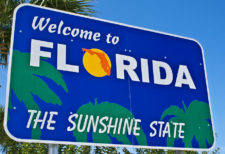 As we previously reported, the new Florida public notice statute set to take affect on Jan. 1 is beset with ambiguity. In general, the statute is designed to give local governments the option to publish notices on their county website in lieu of newspapers. But as the dust has settled from the battle over House Bill 7049, fears about the immediate damage it will wreak on public notice in the state have diminished.
As we previously reported, the new Florida public notice statute set to take affect on Jan. 1 is beset with ambiguity. In general, the statute is designed to give local governments the option to publish notices on their county website in lieu of newspapers. But as the dust has settled from the battle over House Bill 7049, fears about the immediate damage it will wreak on public notice in the state have diminished.
A weird but benign session in Missouri
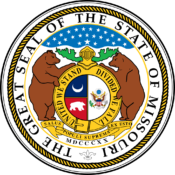 “I’ve been doing advocacy work in the state legislature for 40 years and this was probably the weirdest session I’ve ever experienced,” says Doug Crews, lobbyist and former executive director of the Missouri Press Association (MPA), where he worked for 36 years.
“I’ve been doing advocacy work in the state legislature for 40 years and this was probably the weirdest session I’ve ever experienced,” says Doug Crews, lobbyist and former executive director of the Missouri Press Association (MPA), where he worked for 36 years.
Two related factors made the 2022 session in Jefferson City unusual, according to Crews, who now contracts with Lathrop GPM Consulting, the firm that represents MPA. About half the session was dominated by Senate debate over a redistricting map for Missouri’s eight U.S. Congressional districts. And with the Senate Republican majority split into two caucuses — one ultra-conservative and the other more moderate — functionally speaking there are now three ideologically distinct parties in the state Senate.
Two more states pass web-posting bills
Two more midwestern states passed laws last month requiring newspapers to post notices on their press association’s statewide public notice website. With Minnesota and Michigan joining South Dakota and Nebraska, four states in the region have now passed web-posting laws this year.
In total, eighteen states now have web-posting statutes on the books.
The new law in Minnesota requires newspapers to publish their notices on the Minnesota Newspaper Association’s statewide public notice website and to include an index link to the public notice section on their own websites. (Current law in Minnesota already requires newspapers to post notices on their website; the new law adds the index-link requirement and forbids the notices from being posted behind a paywall.)
Nebraska modernizes public notice law
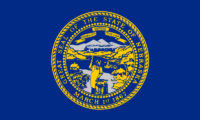 Nebraska became the second midwestern state to update its public notice law in 2022 when Gov. Pete Ricketts (R) signed Legislative Bill 840 on April 18.
Nebraska became the second midwestern state to update its public notice law in 2022 when Gov. Pete Ricketts (R) signed Legislative Bill 840 on April 18.
LB-840 requires newspapers to post notices on the Nebraska Press Association’s statewide website. It also raises public notice ad rates from 45 cents per line to 48 cents per line for 12 months beginning Oct. 1, 2022, and to 50 cents per line on Oct. 1, 2023. That 11 percent boost over the next 18 months is the state’s first public notice rate increase in 26 years.

